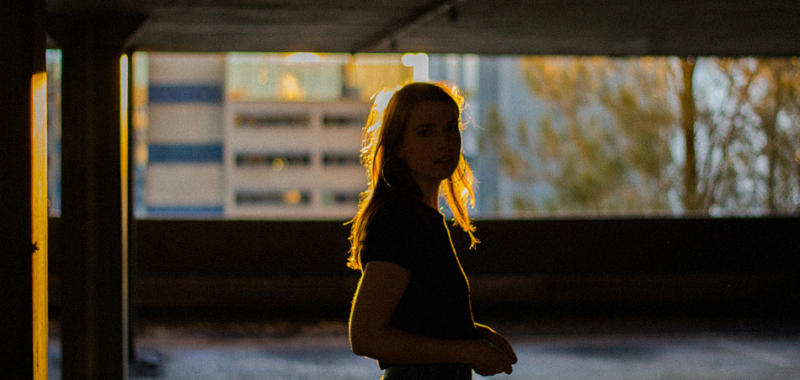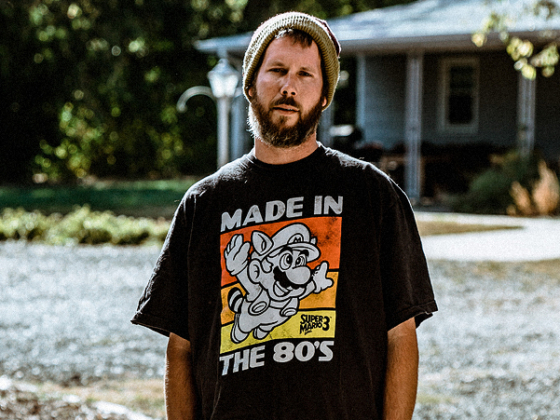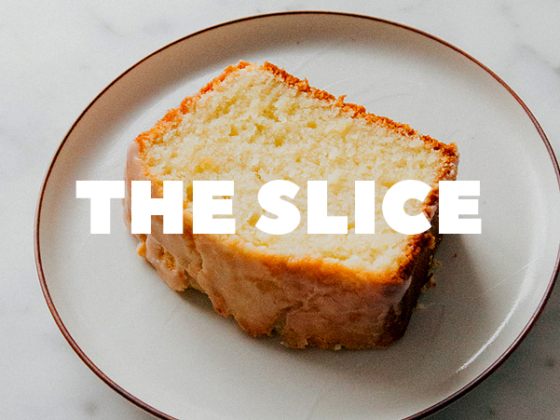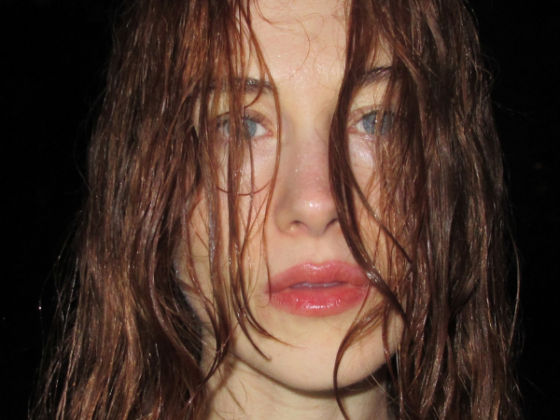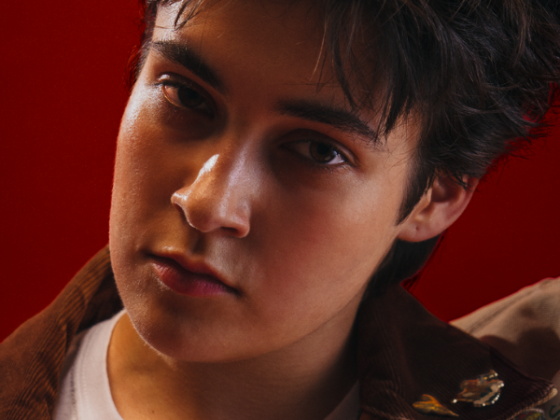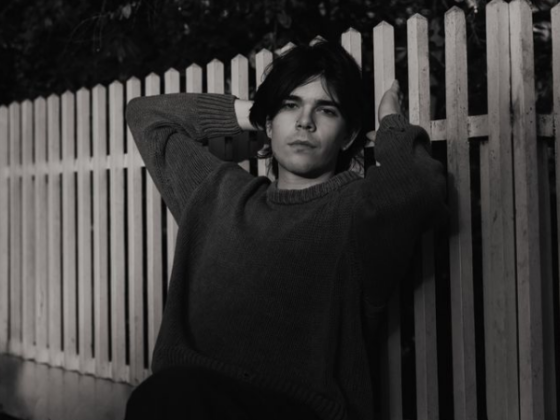Angie McMahon has an air of the unexpected about her. The twenty-five year old Australian singer/songwriter all but sneaks up on me in the bar of her Dublin hotel. “Oh I was hoping that was you,” she says, hugging me hello. “I just have to run and get my stuff, one second.” Scampering off as quickly as she came, she returns a moment later hugging her essential items—a drink, leopard print coat, headphones, tiny notebook and pink pen. Discarding everything (save the drink) in the chair beside her, she semi-collapses into her own seat, apologizing for her fatigue. “The day time has become my night time,” she warns me. McMahon has been on a tour of America supporting Hozier, but has since tour-hopped to play two sold-out nights at The Button Factory with Julia Jacklin, followed by a headline slot at a favourite Irish festival, Other Voices. “Because we’ve been with so many Irish people this month, every time you bring up Dingle they go mad about it! Like, ‘oh my god you get to go to Dingle!!’ ‘Yeah, I get to go to Dingle, magical land of excitement,’” she laughs, shaking off sleep once and for all with the prospect.
Routine is something McMahon finds hard to stick to on tour. If there are rituals, they are loosely implemented. “When I say it’s a ritual, it’s something that I probably do every ten days when I really need to. Like smash vitamins, or…I try to write every day,” she admits. She's stopped drinking before shows, trading the whiskey in for ten minutes of stretching. She did dedicate an entire song on her debut album Salt to her general lack of routine, though. “Pasta” is a tune driven by guitar and urgent vocal, and offset by languid lyrics, like “I just sit in my house making noise for fun/I’m not moving much, or proving much to anyone.” It’s true that the song is about writer’s block. “I feel like it’s hard to write at any time. Even if I was at home, I’d still be like ‘I have no time to write,’” Angie says to me, adding, “but you know, you can wake up that bit earlier or make the effort. I bought this tiny journal because it’s less overwhelming. You can open your tiny journal, you can write one tiny page and you’re going to feel better every time.” Though its title implies irreverence, “Pasta” also spends a fair amount of time dealing honestly with the acute sense of uselessness and depression plaguing many millennials, especially millennial women.
There’s no doubt Salt is a feminist album, and it touches on universally felt female experience without feeling sorry for its anger. It toes the line between punky and delicate, sometimes flitting back and forth between the two with a what-are-you-going-to-do-about-it mischief. One of its angrier moments is “And I Am A Woman,” a song McMahon wrote after an argument with a date. She went home and wrote a three-page mind map to express all she felt on gender equality, sex, and that dinner. “I feel like I’m terrible at conversation and articulating myself on the spot…but I’m grateful for the experiences that have made me work on being more articulate,” she muses. What formed from that mind map was a single-line chorus encased in something direct, aggressive and poignant. “One of the things I found so frustrating was that within myself I wasn’t able to articulate the core basis of some arguments I wanted to make, because I knew that I felt or observed all of these things about women and female experience, but I hadn’t intellectually done the work to talk about it. And it’s something I’m trying to work on more because I want to be able to give to the dialogue in a positive and concise way…for that song in particular, I was just at an earlier stage of my understanding of how to deal with floods of anger.” McMahon brought the song to her father, who said it was good, but unfinished. "I feel like it is finished," she tells me, "because it’s just the beginning of the things I want to say. I also love him to death but he is a man, and he’s not going to be understand the weight of how much is behind a simple line in that song. And I appreciate comments like that from him or anyone because I do want to keep writing about it and it’s never going to be finished. I feel like that’s a song that will go on forever and hopefully I’ll keep reinventing the idea in more songs."
Among McMahon’s recent releases is a contribution to Come On Up To The House: Women Sing Waits, a Tom Waits tribute album consisting entirely of female voices. “Take It With Me,” McMahon’s chosen Waits cover, is quietly breathtaking. Understated and simple, she once again ventures into the unexpected: forgoing the twinkling piano of the Waits version, opting for minimal, mournful guitar and opening on an eerie hum. “Do you have a favourite,” she asks me? “Yeah. Yours.” It’s an honest answer, but McMahon is endlessly humble: “Oh thank you, you don’t have to say that.” To be approached in the first place for a project like this one was astonishing to her. “What do you mean you’re asking me to be on this, you fucking psychos!” She's incredulous, but if there's a truth to the feeling, she hides it behind the joke. “I just like that it was all women,” she continues. “Like, Patty Griffin, Roseanne Cash, Phoebe [Bridgers]…and Corinne Bailey Rae. It was kind of a strange moment because they’re such recognizable names to me, and I don’t really consider myself in a recognizable…” she trails off into her thoughts, but it goes without saying that McMahon is very quickly becoming one of those household names, and this is only the beginning. Already racking up millions of Spotify streams, she’s come a long way from performing pop covers on YouTube. Women Sing Waits was so fruitful in part “just to work through that part of my mind,” she says, “where you’re comparing yourself to other artists. How do you stop comparing yourself and just be happy with your own creativity? It’s just a cool little growth moment.”
Although she has loved Tom Waits most of her life, McMahon's most treasured musical influence is K.D. Lang. Lang is a Canadian vocalist and songwriter who is perhaps best known for her album Hymns of the 49th Parallel, on which she covers her favourite Canadian songwriters. I barely have to bring up Lang's version of Leonard Cohen's "Hallelujah" and she's filled with a renewed sense of energy: "We'd listen to that record in the car, and I’d make my Mum go ‘back to the start of song six please! Back to the start of song six!’ It’s one of those records where I know what the track listing is." Sure enough, a quick Google search finds that "Hallelujah" is the sixth track on Hymns. "Her singing is so classy! Her vocal delivery is so flawless that it made me want to be a singer," McMahon says, as if she hasn't been given similar praise. McMahon has been compared vocally to Janis Joplin, but I confess that later on, while watching her perform solo with her guitar and brunette fringe, growling into the microphone, she reminds me more of a young Patti Smith—shy, but painfully intelligent, with the attitude of a perpetual observer. She thinks it isn't only the power of art, but also the responsibility, to bridge the divisive gaps between people and politics. "Art is unifying," she says matter-of-factly. "And hopefully that’s the role we get to play [as artists]. I do think it’s really important in the world to be focusing on art." She would have gone on, but we're out of time. When I ask for the bill, she turns to the waiter: "Can you actually just put it all on mine? I had this and the pasta." Of course she did.
Connect with Angie McMahon: Spotify | Twitter | Instagram | Website
Feature image by Paige Clark.

